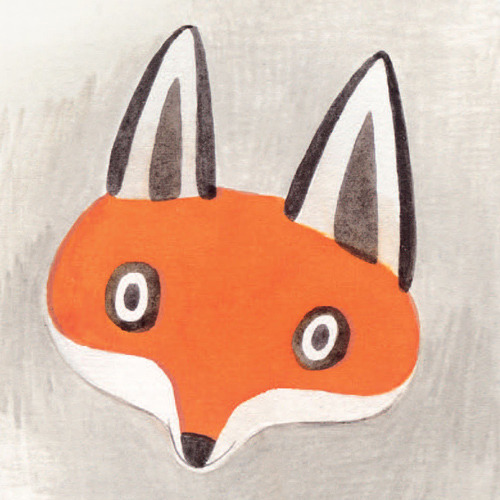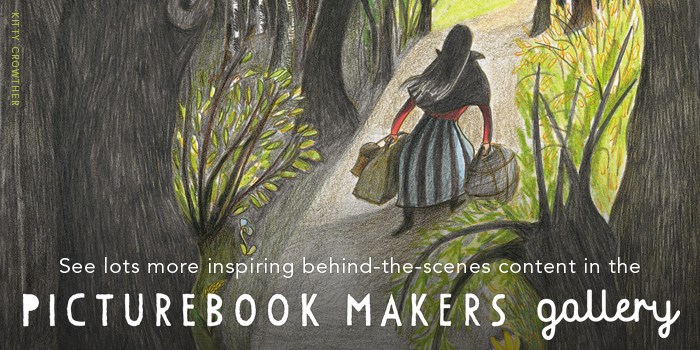< Back to posts
Isabelle Arsenault
Canada

Isabelle Arsenault is a Canadian illustrator who has achieved international recognition for her work. She's won the prestigious Governor General's Award for Children's Literature three times, and two of her picturebooks were named as New York Times Best Illustrated Books of the Year. Isabelle lives and works in Montreal.
In this post, Isabelle talks about illustrating ‘Jane, le renard & moi’ (Jane, the fox & me), which was written by Fanny Britt. This striking graphic novel was originally published in French by Éditions de La Pastèque and has been translated into many languages.
Isabelle: For a long time I'd had the desire to create a graphic story with a good number of pages. Fanny Britt's text was suggested to me and I was touched by its main character: a young girl who is rejected by her peers at school and finds refuge in the novel, ‘Jane Eyre’ by Charlotte Brontë. The unusual form of the story – its length, the two levels of narrative, its subject, its tone – all gave me a glimpse of great possibilities.
I developed my sketches quickly at a small size, directly onto my copy of the manuscript. I am quite the perfectionist: so much so that if I applied myself to my sketches as I do to my final renderings, I'd waste a huge amount of time. The book cover, for example, was doodled quickly. Later, I had the idea for the colours and I scribbled them on my phone. These little visual notes have very little detail, but they are enough to guide me in my work.
I added each corresponding part of the text to my little sketched drawings, so that other people could better follow what was happening in each panel, on each page. It was this version, with the text, that I put forward to my publisher and the author, Fanny Britt. To make sure I was communicating my proposal well, I sat with them in a cafe and I read them the draft of the book from beginning to end, sometimes stopping to give extra details about the images, to explain the way I'd render them, etc.
Thankfully, they were able to understand what I had in mind, and once everything was approved I went directly to the final artwork. The fact that I had done my roughs so loosely allowed me to adapt my artwork according to my moods and wishes during the production of the book. I enjoyed giving space to experimentation and improvisation. I was willing to make mistakes throughout the process.
I approach each of my books in a different way. Each text invokes a particular universe, and I endeavour to grasp it by adapting my techniques, my renderings and my graphical approach to each project. For this book, I had foreseen from the beginning that I would combine colour pages with black and white ones, to reflect the two levels of narration that are present in the story. I also had to choose techniques that would suit the speed of my execution, taking into account the number of pages required for this project (and my slowness!).
Pencil drawings were mandatory to illustrate the pages in black and white. I liked the fact that I could easily redo everything if it didn't work. I also liked the marks that the erased drawings would leave on the paper. Sometimes I'd play with these effects; I used the marks to create textures and tonalities. I like being able to use my hands and play with materials that are so simple and accessible to build my images.
The pages in colour refer to ‘Jane Eyre’, which the character in my book reads enthusiastically. When she dives into this book, the story takes another shape, and it seemed important to me to do something on a graphical level to underline this distinction. I chose coloured ink to get the saturated and fluid effects that allow the readers themselves to breathe and escape too. Through this rendering – not particularly representative of the Victorian age – I also wanted to underline the fact that this part of the story takes place in the imagination of the main character and is therefore shaped by her references. By the end of the book, the two styles converge to support the story, which takes a new direction.
‘Jane, the fox & me’ is a book that, from the beginning, wanted to be very intimate. Fanny Britt's text was inspired by her own history. As for me, I took this very personal text and wanted to interpret it in such a way that it resembles and represents me too.
Fanny and I originally had the feeling that this book – not really for children and not really for adults – would have trouble finding its audience and risked pleasing nobody but the two of us! What followed proved us wrong. The book won many prestigious awards and is now translated into a dozen languages. A new collaboration between the two of us will be published in 2016.
Illustrations © Isabelle Arsenault. Post translated by Gengo and edited by dPICTUS.
Jane, le renard & moi /
Jane, the fox & me
Fanny Britt & Isabelle Arsenault
Éditions de La Pastèque, Canada, 2013
‘This graphic novel is engaging and very moving. Evocative drawings with clever use of colour illustrate Helene's isolation, sadness and, finally, hope.’
—The Bookseller
‘An absolute treasure that blends the realities of children's capacity to be cruel, the possibilities of transcending our own psychological traps, and literature's power to nourish, comfort, and transform.’
—Brain Pickings
- French: Éditions de La Pastèque
- English: Walker Books (UK) – Groundwood Books (USA)
- Italian: Mondadori
- German: Reprodukt
- Spanish: Ediciones Salamandra
- Swedish: Sanatorium Förlag
- Portuguese (Brazil): WMF Martins Fontes
- Russian: Ooo Izdatelstvo Albus Corvus
- Korean: Booknbean
- Japanese: Nishimura Co.
- Chinese (Simplified): Beijing Total Vision Culture Spread Co.






















